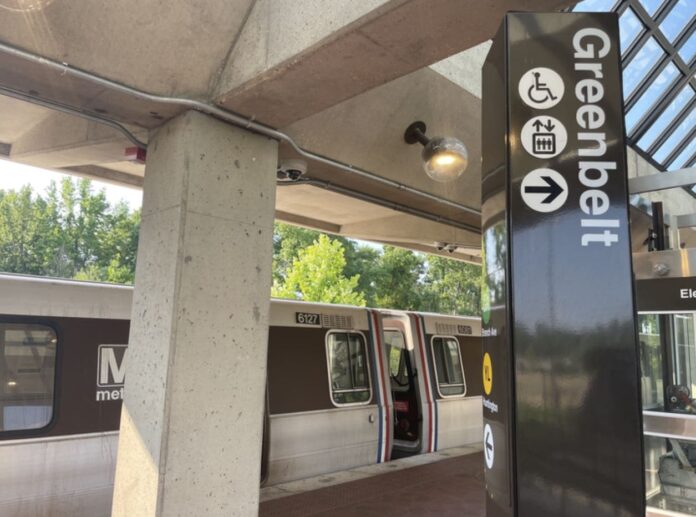Even as the date draws nearer when Metro will be forced by plummeting revenue to order draconian service cuts, there has been no meeting to address the crisis among Virginia Gov. Glenn Youngkin (R), Maryland Gov. Wes Moore (D) and D.C. Mayor Muriel E. Bowser (D), who has called Metro the city’s and region’s “lifeblood.” Instead of proactive bargaining to hammer out what would be a politically painful and costly fix, there are vague comments about transit’s importance.
Metro’s looming problems — a perfect storm of issues that spell the end of transit service as the region has known it starting next summer — will not resolve themselves.
The system faces a shortfall of $750 million in a projected budget of $2.6 billion in the fiscal year starting next July — an unprecedented deficit that can only be bridged by a combination of service cuts and additional revenue. Its main components might be regarded as three R’s: ridership, relief and recession.
- Ridership. Metro’s weekday passenger counts have been halved from pre-pandemic levels, mainly because parts of the federal government and other major employers continue to countenance remote work. The passenger exodus, along with depressed revenue from Metro parking lots and advertising, accounts for nearly 40 percent of Metro’s projected deficit starting next summer.
- Relief. The federal government’s pandemic relief package has kept Metro solvent for the past three years, much as it has done for every other major transit system in the country. Those funds, which contributed more than $2 billion to Metro’s revenue base since 2020, will run out this year.
- Recession. The ongoing threat of recession, linked to persistent high inflation, is straining Metro’s budget and raising the system’s costs. A little over one-third of Metro’s projected deficit next year is attributed to inflation, much of that driven by collective bargaining contracts.
On top of those body blows, Metro is also suffering from subsidy cuts it was dealt from jurisdictional stakeholders in Maryland, Virginia and the District, which feared they faced massive pandemic-era deficits before they were bailed out by the federal government. Together, the three localities, which now enjoy surpluses, withheld nearly $200 million in support from Metro over the past three years — equal to about a quarter of next year’s shortfall. They owe it to the transit system to settle that account.
Metro’s problems, as well as its cost structure, mirror the challenges facing most of the nation’s urban transit systems. The difference is that unlike networks in New York, Los Angeles, Philadelphia, Chicago, Boston and elsewhere, Metro has never had a dedicated, automatic source of annual funding to meet operating costs — usually the full or partial revenue from local sales tax or other taxes earmarked for the transit system. LA Metro receives 80 percent of its annual operating funds from dedicated sources; Boston’s MBTA gets nearly 60 percent of its funding that way.
By contrast, the D.C. area’s Metro system relies for about half its annual operating budget on state and local subsidies that are subject to political shifts — not just in one locality or state, as in most cities, but across two states and the District. That multiplies the difficulty of agreeing on funding increases, or even seemingly simple tasks such as linking annual increases to inflation.
Despite its well-known travails over the years, including accidents and safety problems, Metro is broadly popular. A large majority of riders regard it as reliable and safe. Yet even many of Metrorail’s most loyal passengers would not tolerate service cuts on a scale that Metro is contemplating to balance its budget if it falls off what officials call a “fiscal cliff” next year.
For example, wait times in the Yellow and Blue lines at Reagan National Airport, currently 6 to 12 minutes, would grow to 20 to 30 minutes. At the Orange Line’s New Carrollton station, in suburban Prince George’s County, just east of Washington, passengers now wait just 7½ minutes for a train on average, Metro’s service cuts would mean they would see a train just once every half-hour. That would drive away even more riders.
In past funding crunches, Congress has often stepped in to ensure Metro’s financial health. No surprise why it had a stake in doing so: Before the pandemic, 4 in 10 riders on Metro trains and buses were federal workers. That share has been decimated as many federal agencies, strapped for workers and forced to offer teleworking options, require employees to work from the office just a few times per month.
This situation raises the danger of pandemic-fueled distaste in Congress for further increases in Metro funding. Add to that the uninspiring response of the two stakeholder governors, who have had relatively little to say about Metro and its central role in the Washington area’s vitality, and the outlook looks grim for an energetic push to find new funding sources for the system.
Metro has not been idle in the face of the financial storm clouds it faces. It has slashed expenses and pushed development deals on land it owns around its rail stations. A new funding arrangement could be conditioned on further trims and reforms, for example of labor contracts. Yet there is no avoiding the fact that it will need new funding to avoid steep service cuts, and the death spiral for transit in the region those cuts could trigger. Sooner rather than later, Mr. Youngkin, Mr. Moore and Ms. Bowser need to begin developing a strategy to avoid that scenario. And without establishing an earmarked and reliable source of annual revenue, as the nation’s other major transit systems have, Metro will grapple indefinitely with structural deficits.



